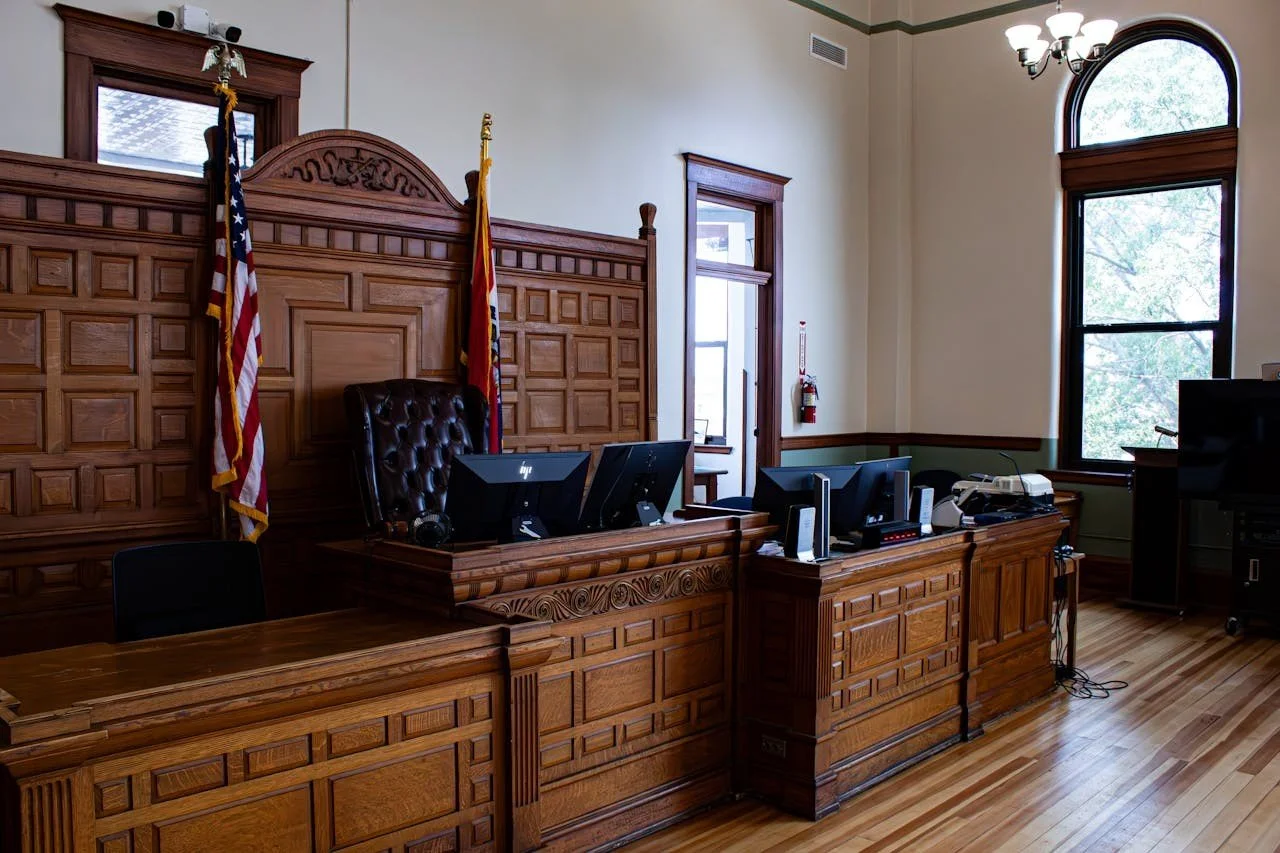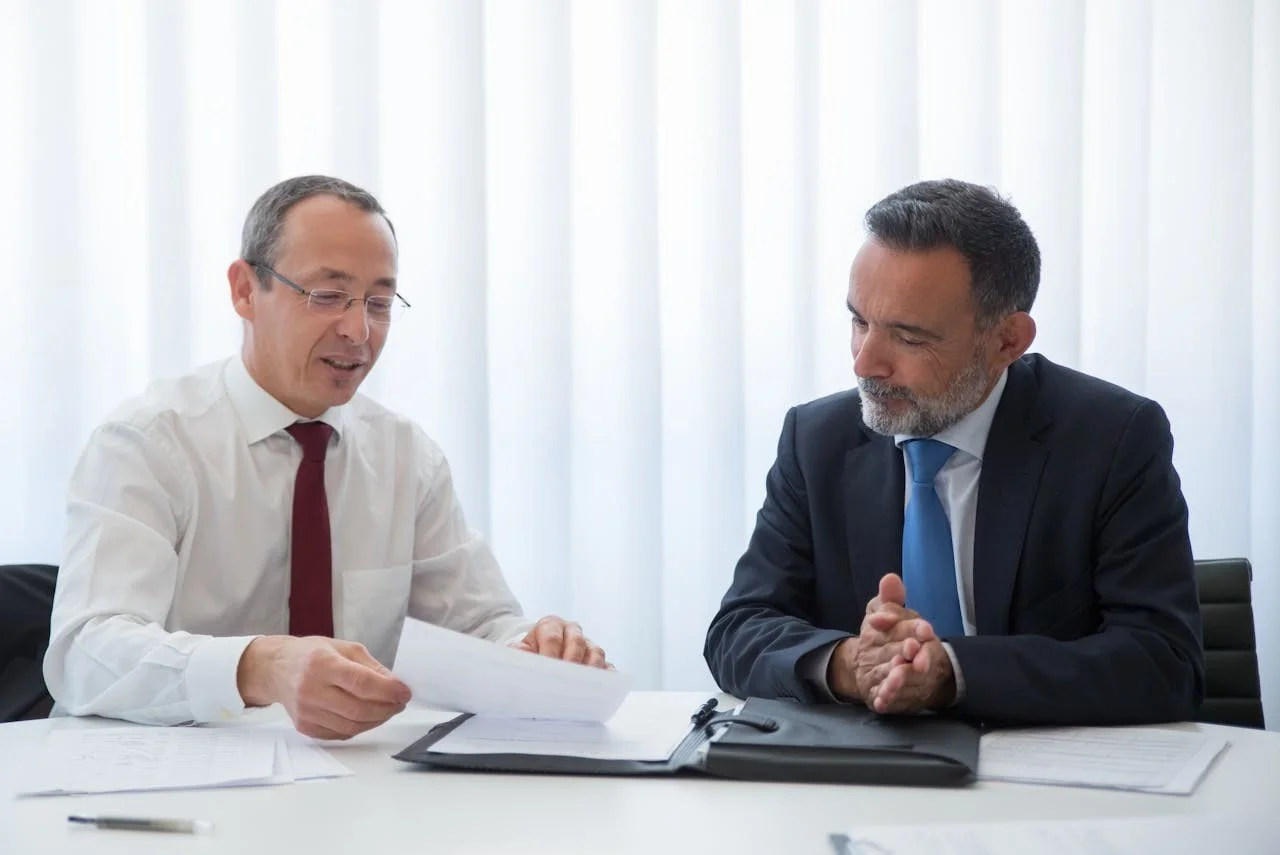From Perfectionist Trial Lawyer to Freedom Coach: Why Helping Lawyers Break Free Became My Life's Work
I'm standing in a courthouse hallway, pacing back and forth. My hands are shaking, my stomach is doing somersaults, and I'm about to face one of Baltimore City's most feared plaintiff's attorneys in my very first solo jury trial.
Here's the crazy part—I'd just graduated top of my law school class and completed a prestigious clerkship with the US District Court of Maryland. On paper, I looked like I had it all figured out. But that voice in my head? It was having a field day: "You're way too inexperienced. This guy's going to eat you alive. Every judge in the building respects him more than you. You're about to embarrass yourself in front of everyone."
Sound familiar?
That moment in the bathroom changed everything for me. It was the first time I truly understood that all the degrees, accolades, and achievements in the world can't quiet that critical inner voice that so many of us lawyers carry around.
After spending four decades in this profession—as a trial lawyer, managing partner, and now as someone who's dedicated his life to helping attorneys find absolute freedom in their careers—I've learned something profound: our biggest professional battles aren't fought in courtrooms. They're fought in our own minds.
Today, I want to share my journey with you. It's a story about how a kid who got picked on for being different became a perfectionist trial lawyer, and how that perfectionist eventually discovered that true success isn't about being flawless—it's about being authentic. This transformation, from a scared, insecure kid to a confident, authentic lawyer, is a journey I believe many of you can relate to and aspire towards.
The Kid Who Learned to Hide Behind Achievements
Let me take you back to where this all began, because I know you'll recognize some of these patterns in your own life.
Growing up, I was that kid—you know the one. Thick glasses, carrying a few extra pounds, and way too smart for my own good. While other kids were playing sports and being cool, I was getting straight A's and feeling like an outsider looking in.
The playground can be a brutal place when you're different. Kids called me names like "Arnold" and "Pugsley"—not exactly the confidence boosters a young person needs. But here's what I discovered: when you can't fit in, you can try to stand out through achievement instead.
So that's exactly what I did. I threw myself into academics like my life depended on it. Every A+ became a shield against criticism. Every academic honor felt like proof that I was worth something after all.
The strategy worked—sort of. I graduated number one in high school, then in college, and then in law school. I even became a competitive golfer along the way. From the outside, it looked like success. But inside? That scared, insecure kid was still running the show, constantly trying to prove his worth through the next achievement.
Here's what I wish someone had told me back then: perfectionism isn't really about excellence. It's about fear. Fear of not being good enough. Fear of being found out. The fear of rejection we experienced long ago.
Early Career: When Success Doesn't Feel Like Success
Fast forward to my early legal career. Despite landing that coveted federal clerkship—a position that should have screamed "you've made it!"—I still felt like an imposter waiting to be discovered.
When it came time to choose my path, I could have accepted an offer to a prestigious big law firm. My academic record and clerkship had opened every door imaginable. But you know what I did? I went back to the small firm where I'd worked during law school. It wasn't the most glamorous choice, but it felt safe. Because sometimes when you've spent your whole life feeling not quite good enough, you choose comfort over challenge. And that's okay. It's all part of the journey towards authenticity and personal growth.
Looking back, though, that 'safe' choice turned out to be one of the best decisions I ever made. At Huesman, Jones and Miles, I found something I hadn't expected: authentic mentorship from lawyers who showed me what it really means to practice with integrity. Their guidance was transformative, and it's a testament to the power of mentorship in our profession.
Dick Lerch taught me that you don't need to be the loudest voice in the room to be the most effective. His quiet confidence and genuine warmth with juries showed me that real strength often looks like humility. Then there was Joe Huesman, a Korean War veteran who taught me something that would stick with me forever: "Don't worry about what other people think when you know you're doing the right thing."
These men showed me that excellence and authenticity could coexist—something my perfectionist tendencies had never allowed me to believe was possible. Their example taught me that embracing authenticity is not a weakness, but a strength. It's a lesson I carry with me to this day, and one I hope to impart to you.
The Courtroom: Where Fear Meets Reality
For three decades, I specialized in transportation litigation, defending trucking companies and their drivers in cases involving severe personal injuries. Let me tell you, there's nothing quite like walking into a federal courtroom where everyone's sympathies lie with the injured plaintiff, and you're representing the "big bad truck company."
The pressure was intense. Every case felt like my entire career was on the line. Insurance companies could pull all their business if I were to lose. The financial stakes were enormous, and my perfectionist brain loved to remind me of every possible way things could go wrong.
I remember one case in particular—a sideswipe accident with severe injuries. My client was a truck driver who didn't speak well and had limited education. The opposing attorney was accomplished and well-respected. Everything seemed stacked against us. But you know what happened? We won. The jury found for my client.
Even after winning twelve consecutive cases, though, that voice of self-doubt never went away. External validation, I learned, never fully quiets internal criticism. This realization became crucial later in understanding why so many lawyers struggle, no matter how successful they appear from the outside.
I also learned about the unpredictable nature of our profession. I once tried what seemed like a slam-dunk personal injury case where liability was clear in my client's favor. The defense barely contested it. Yet somehow, inexplicably, we lost. The jury returned a defense verdict that made no sense to anyone in the courtroom.
These experiences taught me a vital lesson: in law, as in life, we can't control outcomes. We can only control our preparation, our authenticity, and our commitment to serving our clients' best interests.
The Darkest Chapter: When Success Becomes Hollow
Here's the part of my story that's hardest to share, but also the most important for you to hear.
Despite my early professional success, I was struggling with something that almost destroyed everything I'd built: alcohol addiction.
What started as casual social drinking gradually became something I needed just to get through each day. The transition from choosing to drink to having to drink happened so slowly I barely noticed—until suddenly, I couldn't stop.
The worst part? I was living a double life. Successful attorney by day, secretly getting drunk almost every night. I told my then wife I'd quit drinking, then found ways to hide my drinking from everyone, including myself.
The turning point came at a family gathering. I had what I thought was a meaningful, deep conversation with my 15-year-old goddaughter. The next morning, I couldn't remember a single word of it. That blackout terrified me—as lawyers, our minds are our most valuable tools.
That Monday night, I walked into my first recovery meeting. What I found there changed everything.
Finding Hope in the Stories of Others
In that room full of people in recovery, I discovered something I hadn't seen in years: genuine happiness. These weren't people who had it all figured out from the start. They were people who had faced their deepest struggles and found a way through.
Their stories gave me something I desperately needed—hope. If transformation was possible for them, maybe it was possible for me too.
Recovery taught me tools I'd never learned in law school: how to be honest with myself, how to accept help from others, how to find fulfillment through service rather than achievement. These principles didn't just save my life—they revolutionized my approach to practicing law.
I became deeply involved with the Maryland Lawyers' Assistance Program, eventually serving as its chair in my county for approximately 20 years. Through this work, I met countless attorneys struggling with similar challenges. I saw how the unique pressures of our profession—the perfectionism, the constant judgment, the adversarial nature of our work—create perfect storms for mental health challenges.
But I also witnessed miracles. Lawyers who seemed beyond help, finding their way back to health, happiness, and successful practice. These experiences showed me that transformation isn't just possible—it's happening all around us when we create the right conditions for growth.
The Calling: From Personal Freedom to Helping Others
After three decades of managing a successful law firm, my wife Brenda and I made a decision that surprised everyone, including ourselves. We moved to Pinehurst, North Carolina.
This wasn't just a change of scenery—it was a fundamental shift in how I wanted to spend the rest of my career. Away from the daily pressures of firm management, I finally had the space to reflect on what had brought me the most fulfillment over the past four decades in law.
The answer was clear: mentoring and supporting other lawyers.
Every struggle I'd faced, every mistake I'd made, every lesson I'd learned through trial and error—it all felt like preparation for this next chapter. My journey from bullied kid to successful attorney to person in recovery has equipped me with something unique to offer other lawyers who were fighting their own internal battles.
Why This Work Sets My Soul on Fire
Let me tell you why coaching lawyers has become more than just my profession—it's become my passion.
First, there's the simple joy of service. Recovery taught me that the best way to maintain what you've been given is to give it away. When I help a lawyer break free from limiting beliefs, I'm not just changing one life—I'm creating ripple effects that impact their clients, families, colleagues, and communities.
Second, I've witnessed firsthand how much our profession has changed. The legal world I entered in the 1980s feels like a different planet compared to what lawyers face today. Technology has accelerated everything. Competition is fiercer. Client expectations are higher. The traditional paths to success are being disrupted daily.
Yet our law schools still teach us technical skills while completely ignoring the internal challenges that will ultimately determine whether we thrive or merely survive in practice.
The statistics are heartbreaking: lawyers experience depression, anxiety, and substance abuse at rates far higher than the general population. We have one of the highest suicide rates among professions. These aren't just numbers—they represent real people struggling with problems that coaching can address.
But here's what gives me hope: transformation is possible at any stage of your career. I've worked with lawyers in their twenties who feel overwhelmed by imposter syndrome, and lawyers in their sixties who thought they were stuck in patterns they'd carried for decades. Growth doesn't have an expiration date.
How Real Change Happens
The lawyers I work with often come to me feeling trapped by their own success. They've built practices that look impressive from the outside but feel like prisons from the inside. They're making good money but sacrificing everything else that matters. They're respected by peers but struggling with self-doubt. They're helping others solve problems, but can't solve their own.
Sound familiar?
Here's what I've learned: real change doesn't come from working harder or managing time better. It comes from addressing the internal beliefs and patterns that drive our external behaviors.
When I work with lawyers, we create safe spaces where it's okay to admit that success hasn't brought the fulfillment they expected. We explore the childhood experiences and professional pressures that shaped their relationship with work. We identify the fears that keep them trapped in unsustainable patterns.
Most importantly, we develop practical tools that work within the demands of legal practice. This isn't therapy—it's strategic transformation explicitly designed for the unique challenges attorneys face.
The results are profound. Lawyers who once practiced out of fear start practicing with confidence. Attorneys who felt like prisoners in their own success discover how to create practices that serve their life goals rather than consuming them.
The Ripple Effect of One Transformed Lawyer
When one lawyer transforms their relationship with practice, the effects spread far beyond that individual.
Their clients notice the difference immediately. There's something powerful about working with an attorney who brings authentic confidence rather than anxiety to every interaction. These lawyers communicate more clearly, set better boundaries, and provide counsel based on genuine expertise rather than people-pleasing or fear of consequences.
Their families get more present, engaged partners and parents. When lawyers stop depleting themselves through perfectionism and unsustainable practice habits, they have energy left over for the relationships that truly matter.
Their colleagues experience better workplace cultures. Transformed lawyers become models of sustainable success, demonstrating to others that it's possible to excel professionally without compromising personal well-being.
Even their communities benefit. Lawyers who've found authentic fulfillment in their work become better leaders, mentors, and contributors to the profession's reputation.
A Vision for Our Profession
Here's what I dream about: a legal profession where attorneys practice from a position of strength rather than fear, where success is measured not just by billable hours and case outcomes, but by sustainability, authenticity, and genuine impact.
I envision lawyers who bring their whole, integrated selves to their work—professionals who've done the internal work necessary to serve others from a place of abundance rather than scarcity.
Through my podcast "The Free Lawyer," my book "Breaking Free," and my coaching practice, I'm working to build a community of attorneys committed to this vision. We're sharing tools, supporting each other's growth, and proving that excellence and authenticity aren't opposites—they're partners.
An Invitation to Your Own Transformation
If you've made it this far in my story, something has resonated with you. You may recognize your own patterns in my journey. Maybe you're tired of feeling trapped by your own success. You may be ready to discover what professional freedom feels like.
Here's what I want you to know: transformation is possible. You don't have to struggle alone. The freedom to practice authentically while achieving professional success isn't just possible—it's your birthright as an attorney.
Your past struggles, like mine, can become your greatest strengths. Every challenge you've faced has equipped you with wisdom and compassion that can serve both your clients and your profession.
The internal battles we fight as lawyers—perfectionism, imposter syndrome, fear of failure, people-pleasing—they're not character flaws. They're human responses to challenging circumstances. And they can be transformed.
After four decades in this profession, I've learned that our greatest professional challenges often stem from internal battles that no law school addresses. However, I've also learned that when we address these challenges directly, with courage and support, we not only improve our own lives—we elevate our entire profession.
The journey from perfectionist trial lawyer to freedom coach taught me that true success isn't about being flawless. It's about being authentic, sustainable, and genuinely helpful to others.
Your willingness to grow and transform can create ripple effects that extend far beyond your own practice. Every lawyer who chooses authenticity over perfectionism, service over ego, and sustainable success over burnout contributes to healing our profession from the inside out.
The work isn't always easy, but it's always worth it. And you don't have to do it alone.
Ready to begin your own journey from perfectionist lawyer to authentic professional? I'd love to explore how coaching might serve your unique situation. Schedule a complimentary consultation at www.garymiles.net or here.. Your transformation story is waiting to be written—let's discover it together.




